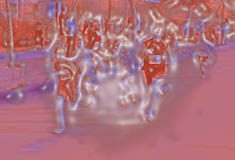Complexity of The Fear Paradox.
הרב שי טחןל שבט, תשפד09/02/2024Do not fear that Hashem came to punish you; instead, He came to instill the exalted and elevated fear upon you
תגיות:פחדיראת השםפרשת שבוע
ויאמר משה אל העם אל תיראו כי לבעבור נסות אתכם בא האלהים ובעבור תהיה יראתו על פניכם לבלתי תחטאו (שמות כ, טז)
In our parashah (Yitro), we encounter one of the most perplexing pesukim, capable of inducing bewilderment. At Mount Sinai, during the reception of the Ten Commandments, the first two were directly articulated by Hashem Yitbarach. As Hashem spoke, His voice resonated with such force that not only was it heard, but there was also a phenomenon where His voice became visible. Faced with the overwhelming experience, the nation, in fear, beseeched Moshe Rabenu to act as an intermediary, expressing their apprehension about direct communication with Hashem. In response, Moshe reassured them, saying, "Do not fear, for Hashem has come to elevate you, that His fear may be before you." This pasuk begins with Moshe encouraging them not to fear, yet within the same sentence, he conveys that the purpose of Hashem's communication is to instill fear. How do we reconcile this apparent contradiction?
fear, beseeched Moshe Rabenu to act as an intermediary, expressing their apprehension about direct communication with Hashem. In response, Moshe reassured them, saying, "Do not fear, for Hashem has come to elevate you, that His fear may be before you." This pasuk begins with Moshe encouraging them not to fear, yet within the same sentence, he conveys that the purpose of Hashem's communication is to instill fear. How do we reconcile this apparent contradiction?
To unravel this, let us delve into the teachings of Rabbi Moshe Chaim Luzzatto (1707–1746) in his important work "Mesillat Yesharim" (Chapter 24). Same can be found in Orchot Tsadkim (שער יראת שמים). He elucidates that the fear of Hashem is bifurcated into two components: the fear of punishment named Yirat Hachet, and the fear stemming from Hashem's greatness and exaltation called Yirat Haromemut.
He writes: "We must first introduce that there are two types of fear, effectively three types. The first type is very easy to attain, there being nothing easier. The second is difficult, while the second part of the second type is more challenging than everything. Its perfection is likewise a very great form of perfection.
The first type is fear of punishment (Yirat Hachet), and the second is fear of God's exaltedness (Yirat Haromemut), of which Fear of Sin is the second part therein. We will now explain their matters and differences.
Fear of punishment, as its name implies, is for a person to fear transgressing the word of Hashem, due to the punishments incurred for the transgression, whether to body or soul. This type of fear is certainly easy to attain, for every person loves themselves and fears for their soul, and there is nothing that deters a person from doing something more than the fear that this thing might bring harm to them.
The second type of fear is fear of Hashem's exaltedness (Yirat Haromemut). It means that a person distances and refrains from sin because of Hashem's great honor. For how could his heart of flesh and blood, lowly and petty, allow or dare to do something against the will of the Creator?!
This type of fear is not so easy to attain, for it will arise only out of knowledge and thought, namely by contemplating Hashem's exaltedness and the lowliness of man. All these things are outgrowths of the intellect which understands and attains insight."
Upon grasping these concepts, we can now decipher the significance of the conflicts within the pasuk. When Moshe observed the overwhelming fear that gripped the nation upon hearing the powerful voice of Hashem, causing them to dread for their lives, he reassured them that there was no need at this scenerio to fear punishment for their sins, as Hashem had not come to inflict punishment; therefore, the voice did not intend to instill the fear of their sins (Yirat Hachet). Instead, Moshe clarified that the purpose of the resounding voice was to cultivate the fear of Hashem's greatness and exaltation.
Hence, the pasuk is comprehended in this manner: "Do not fear that Hashem came to punish you; instead, He came to instill the exalted and elevated fear upon you."
It's not the only instance where Moshe Rabenu emphasizes the importance of Yirat Shamayim. At a later time, he instructs the people that Yirat Shamayim is the ultimate purpose of everything, stating (דברים י, יב), "What does Hashem ask from you? Only to fear Him." Chazal elaborate: אין להקדוש ברוך הוא בעולם הזה אלא יראת שמים בלבד (שבת לא, ב) , expressing that Hashem desires Yirat Shamayim more than all other things.
May we all merit to possess both types of Yirat Shamayim.
In our parashah (Yitro), we encounter one of the most perplexing pesukim, capable of inducing bewilderment. At Mount Sinai, during the reception of the Ten Commandments, the first two were directly articulated by Hashem Yitbarach. As Hashem spoke, His voice resonated with such force that not only was it heard, but there was also a phenomenon where His voice became visible. Faced with the overwhelming experience, the nation, in

To unravel this, let us delve into the teachings of Rabbi Moshe Chaim Luzzatto (1707–1746) in his important work "Mesillat Yesharim" (Chapter 24). Same can be found in Orchot Tsadkim (שער יראת שמים). He elucidates that the fear of Hashem is bifurcated into two components: the fear of punishment named Yirat Hachet, and the fear stemming from Hashem's greatness and exaltation called Yirat Haromemut.
He writes: "We must first introduce that there are two types of fear, effectively three types. The first type is very easy to attain, there being nothing easier. The second is difficult, while the second part of the second type is more challenging than everything. Its perfection is likewise a very great form of perfection.
The first type is fear of punishment (Yirat Hachet), and the second is fear of God's exaltedness (Yirat Haromemut), of which Fear of Sin is the second part therein. We will now explain their matters and differences.
Fear of punishment, as its name implies, is for a person to fear transgressing the word of Hashem, due to the punishments incurred for the transgression, whether to body or soul. This type of fear is certainly easy to attain, for every person loves themselves and fears for their soul, and there is nothing that deters a person from doing something more than the fear that this thing might bring harm to them.
The second type of fear is fear of Hashem's exaltedness (Yirat Haromemut). It means that a person distances and refrains from sin because of Hashem's great honor. For how could his heart of flesh and blood, lowly and petty, allow or dare to do something against the will of the Creator?!
This type of fear is not so easy to attain, for it will arise only out of knowledge and thought, namely by contemplating Hashem's exaltedness and the lowliness of man. All these things are outgrowths of the intellect which understands and attains insight."
Upon grasping these concepts, we can now decipher the significance of the conflicts within the pasuk. When Moshe observed the overwhelming fear that gripped the nation upon hearing the powerful voice of Hashem, causing them to dread for their lives, he reassured them that there was no need at this scenerio to fear punishment for their sins, as Hashem had not come to inflict punishment; therefore, the voice did not intend to instill the fear of their sins (Yirat Hachet). Instead, Moshe clarified that the purpose of the resounding voice was to cultivate the fear of Hashem's greatness and exaltation.
Hence, the pasuk is comprehended in this manner: "Do not fear that Hashem came to punish you; instead, He came to instill the exalted and elevated fear upon you."
It's not the only instance where Moshe Rabenu emphasizes the importance of Yirat Shamayim. At a later time, he instructs the people that Yirat Shamayim is the ultimate purpose of everything, stating (דברים י, יב), "What does Hashem ask from you? Only to fear Him." Chazal elaborate: אין להקדוש ברוך הוא בעולם הזה אלא יראת שמים בלבד (שבת לא, ב) , expressing that Hashem desires Yirat Shamayim more than all other things.
May we all merit to possess both types of Yirat Shamayim.
הוסף תגובה
עוד מהרב שי טחן
עוד בנושא טור אישי







